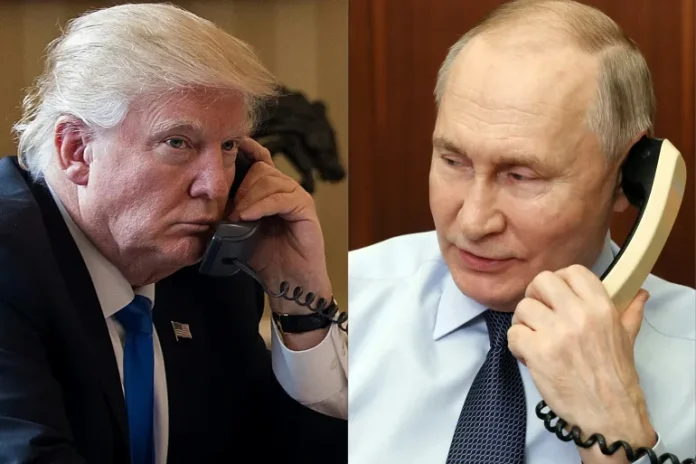European leaders were stunned by Donald Trump’s position, who after talks with Vladimir Putin refused to support new sanctions against Moscow. Sources at the Financial Times reported that US allies had expected a tougher line, but the American president made it clear that he did not consider it necessary to increase pressure on Russia.
On Monday, Trump had a telephone conversation with the Russian president that lasted more than two hours. After the conversation, the White House chief said that Moscow and Kyiv would soon begin negotiations, specifying that the terms should be worked out by the parties themselves, who, in his words, have “exclusive knowledge of the details.”
Trump called the talks with Putin “good” and noted that “certain progress” had been made. The Russian president, in turn, expressed his readiness to work with Ukraine on a memorandum that could set out the parameters of a future peace agreement. Among them, he mentioned the principles of settlement, possible terms for the conclusion of the agreement and a temporary ceasefire upon reaching an agreement.
In a conversation with journalists after speaking with Putin, Trump stated that he expects progress in resolving the conflict in Ukraine. “Very big egos involved, I tell you,” Mr. Trump told reporters Monday afternoon. “Big egos involved. But I think something’s gonna happen. And if it doesn’t, I just back away and they’re gonna have to keep going. Again, this was a European situation,” he said.
EU is shocked by the results of the call
After talking with Putin, Trump spoke with European leaders, including French President Emmanuel Macron, German Chancellor Friedrich Merz, Italian Prime Minister Giorgia Meloni, Finnish President Alexander Stubb and European Commission President Ursula von der Leyen.
According to the FT, US allies were puzzled by how mildly Trump reacted to the outcome of his conversation with Putin. They expected Washington to propose tougher sanctions, including new restrictions on Russia’s energy and financial sectors. However, the American leader, on the contrary, made it clear that he does not currently consider it necessary to increase economic pressure on Moscow. The FT notes that Europe expected Trump to agree to new tough sanctions in the absence of signs of de-escalation from the Kremlin. But this did not happen.
The US presidential administration, as before, is avoiding direct statements on increasing pressure on Russia. Since the beginning of the conflict, Trump’s position has remained changeable: in March, he froze arms supplies to Kyiv, and then offered the US as a possible mediator in the negotiations. At the same time, the White House has not yet supported initiatives to expand sanctions, including those proposed by Congress.
Europe calls for tougher sanctions
Immediately after talks with Trump, the German government said that EU countries intend to increase sanctions pressure on Russia. According to German government spokesman Steffen Seibert, the participants in the call confirmed their readiness for new measures against Moscow.
“The European participants said they would increase pressure on Russia through sanctions,” the German government spokesman said. Seibert did not specify what sanctions he was referring to. It is unclear whether this is related to the 17th package of restrictions, which the European Union may approve as early as this week, or whether additional initiatives are being discussed.
Chancellor Friedrich Merz previously spoke about the possible confiscation of frozen Russian assets and new restrictions on the banking and energy sectors. Berlin also emphasised that Europe would continue to coordinate its actions with the United States on negotiations and pressure on Moscow.
The world after the Putin-Trump conversation
Trump heard first-hand Moscow’s position, which is that a truce is only possible in conjunction with the end of the conflict, and seems to have accepted it for now. Of course, there are no guarantees that the American leader will not change his mind and put forward new demands on Moscow, but for now, it is clear that Russian diplomacy is gaining relatively comfortable conditions for continuing the conflict.
Russia has not backed down from its demands and has not agreed to anything less, while the European plan for escalation has failed at this stage. A 30-day truce is no closer or more likely. Analysts emphasise that Trump’s rhetoric after his conversation with Putin was satisfactory. The sides spoke respectfully and even warmly about each other. The likelihood of secondary sanctions being imposed in the near future has become slightly lower.
On May 16, Russian-Ukrainian talks were held in Istanbul, with the parties agreeing to exchange prisoners on a “1,000 for 1,000” basis.
On May 17, US Secretary of State Marco Rubio held a telephone conversation with Russian Foreign Minister Sergey Lavrov, during which they exchanged views on the results of the talks, according to the Russian Foreign Ministry. After their conversation, Rubio said in an interview that the US could tighten sanctions against Russia if the settlement of the conflict in Ukraine did not yield results.
